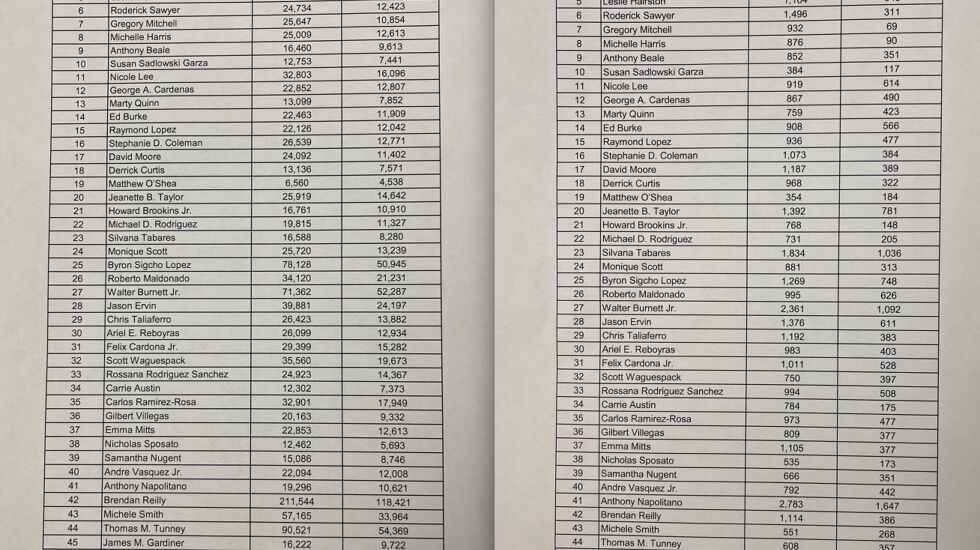
To motorists returning to their vehicles to find a parking ticket on the windshield, it always seems like Chicago is in a ticketing blitz.
This year, they might be right.
Ticketing is up 25.7% through the first six months of 2022 — from 853,906 tickets through June 30 of last year to 1,073,919 tickets during the same period this year.
That’s pretty remarkable, considering Chicago made up for lost time in 2021 to recoup pandemic-related losses in booting and ticketing, two of city government’s biggest revenue generators.
Booting is headed in the opposite direction. It’s down 12.6% — from 27,656 of the wheel-locking devices applied through June 30 of 2021 to just 24,158 vehicles booted during the same period this year.
As always, the 42nd Ward — which includes downtown and the River North entertainment district — drove the ticketing blitz, with a 31% increase that exceeded the citywide average.
It had 118,421 tickets written through June 30, compared to 90,190 during the first six months of last year.
The next highest wards for parking tickets: the 44th (54,369); 25th (50,945); 27th (52,287); 2nd (49,730); 3rd (44,190), 1st (42,213); 4th (39,485); 43rd (33,964) and 46th (32,718).
Ald. Brendan Reilly said he’s “glad to see” the city making a “better effort” at downtown parking enforcement.
“Many of these tickets are associated with loading zone, tow zone and traffic lane violations. Typically, delivery fleets are the chief culprit. More frequent ticketing of these types of offenses will, hopefully, serve as a deterrent to this bad behavior,” Reilly wrote in an email to the Sun-Times.
But Reilly is “very disappointed that the city has not prioritized ticketing” for unloading or parking in bike lanes.
“That illegal, dangerous activity is rampant across the city and is placing the lives of bicyclists at risk. This needs to be made a much greater enforcement priority,” Reilly wrote.
Although booting volume is down from the same period last year, the list of wards with the most motorists booted remained much the same, with a few exceptions.
The 41st Ward, which includes O’Hare Airport, once again tops the list, with 1,647 boots applied. Next: the 3rd (1,130); 27th 1,092); 23rd, which includes Midway Airport (1,036) ; 4th (962); 20th (781); 25th (748); 1st (706); 5th (645); 26th (626) and 11th (614).
The ward-by-ward list was distributed to alderpersons during opening day of City Council budget hearings.
Ald. Jeanette Taylor (20th) asked City Comptroller Reshma Soni how the city “coordinates with the other folks that do boots.”
“We sold the parking meters. They are ticketing. So is the Department of Finance. Are y’all comparing notes? Have y’all re-looked at that contract to see if we could renege because they’re making a killing,” Taylor said.
Soni assured Taylor the city holds monthly meetings with Chicago Parking Meters LLC to determine whether “we’re covering the most areas possible” and “trying to learn from trends that are out there.”
“Things change, as we’ve seen with COVID and impacts on driving and how it impacts people coming into the city,” Soni said.
“On top of the metered enforcement, we’re doing the non-metered enforcement as well. So we’re trying to be more efficient in how we’re doing that” with Chicago Parking Meters.
Taylor was not appeased.
“We’ll see the Department of Finance come out and then, the very next day, folks with the green shirts [from Chicago Parking Meters LLC] are doing the same exact thing on the same exact block. So, it seems like our folks are getting taxed doubly. And the problem is, the first set of money we’ll get. The second set is not ours,” Taylor said.
Chief Financial Officer Jennie Huang Bennett countered: “We get all of the money off of ticket enforcement. They go out and write tickets. But we as the city of Chicago make the revenues off the tickets.”
Taylor nevertheless asked to see ward-by-ward figures of the number of tickets issued by Chicago Parking Meters LLC.
“I would love to see what they’re writing versus what we’re writing because it seems like they’re making a killing and we’re struggling,” she said.

For years, ticketing and booting were headed in opposite directions.
Parking ticket writing declined steadily while the city made greater use of the boot.
Both declined in 2019.
That changed in 2018 when parking ticket writing stabilized while booting declined 10.5% just one year after an 11% increase.
During the pandemic, the stay-at-home shutdown and prolonged economic slowdown triggered by COVID-19 had such a chilling effect on driving for business and pleasure, insurance giants doled out rebates.
Booting and ticketing followed suit.







